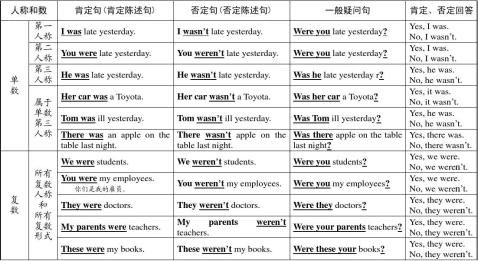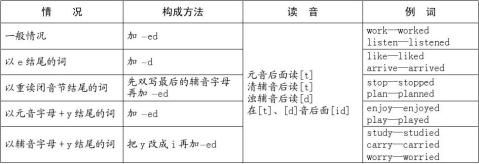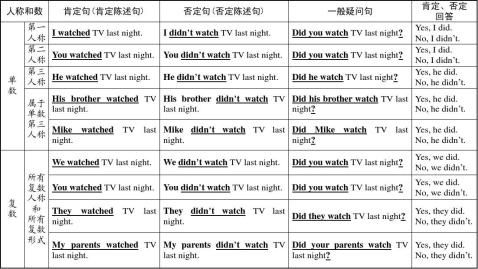语法讲与练3 一般过去时
一、概念
表示在的过去某个时间里所发生的动作或存在的状态。通常在句子里找到表示过去时间的词或词组。如:yesterday,yesterday morning,yesterday afternoon,yesterday evening,the day before yesterday(前天),last night,last week,last month, last year,a moment ago(刚才),just now(刚才), two days ago,a week ago,in 1990等。
如: I went to bed at eleven last night. 昨晚我11:00睡觉。
二、句子结构
1.在表示某个时间里存在的状态的句子,系动词用过式was,were构成。
如:(1)I was at home yesterday. 昨天我在家。
(2)We were in the gym just now. 刚才我们在体育馆。
2.在表示过去某个时间里发生的动作,用动词的过去式构成。
如:I visited my uncle yesterday. 昨天我拜访了我的叔叔。
三、动词过去式的构成规律
(一)规则动词的过去式
1.一般情况下,在动词原形后面加-ed;
look→looked play→played start→started visit→visited
2.以不发音e结尾的动词,在词尾直接加-d;
live→lived use→used
3.以“辅音字母+ y”结尾的动词,先将 y 改为i ,再加 –ed;
study→studied, try→tried fly→flied
4.以重读闭音节(即辅音+元音+辅音)或r音节结尾,末尾只有一个辅音字母的动词,要先双写这个辅音字母后,再加 –ed。
stop→stopped plan→planned, prefer→preferred
(二)不规则动词的过去式
1.改变动词中的元音;
begin→began drink→drank come→came eat→ate grow→grew run→ran know→knew win→won speak→spoke take→took write→wrote get→got
2.变词尾的–d 为–t ;
build→built lend→lent send→sent spend→spent bend→bent
3.与动词原形一样;
cut→cut put→put cost→cost hurt→hurt shut→shut
4.变-ay 为-aid (少数动词);
say→said pay→paid lay→laid
5.采用不同词根;
sell→sold teach→taught buy→bought
6.其他。
am/is→was are→were have/has→had do→did
五、加“-ed”后的读音方法
1.ed加在清辅音后面读/t/。
finished /-t/ help /-t/ asked /-t/
2.ed加在浊辅音或元音结尾的,读/d/。
played /-d/ lived /-d/ enjoyed /-d/
3.ed加在/t/或/d/后面,读/id/。
wanted /-tid/ needed /-did/ visited /-tid/
六、句式变化
(一)一般过去时的一般疑问句
1.把was, were放在句首,其余位置不变。由Was??引导的一般疑问句,肯定答为:Yes,… was. 否定回答为:No,…. wasn’t. 由Were??引导的一般疑问句,肯定回答为:Yes,… were. 否定回答为:No,… weren’t.
如:
(1)I was born in Shanghai. →Were you born in Shanghai?
→Yes, I was. (肯定回答) →No, I wasn’t. (否定回答)
(2)They were in Li Yan’s home last night. →Were they in Li Yan’s home last night? →Yes, they were. (肯定回答) →No, they weren’t. (否定回答)
2.在行为动词的句子中,要用助动词词did来引导,其余的语序不变。要注意的是,要把行为动词的过去式改为原形。肯定回答为:Yes, ?did. 否定回答:No, ?didn’t.
如:John played computer games last night.→Did John play computer games last night? →Yes, he did. (肯定回答) →No, he didn’t. (否定回答)
(二)一般过去时的否定句
1.在表示过去存在的状态的句子中,相接在was, were的后面加上not。
如:
(1)He was in the park the day before yesterday.
→He was not in the park the day before yesterday.
(2)We were busy last week.
→We were not busy last week.
2.在表示过去的时间发生的动作的句子中,要在行为动词的前面加助动词didn’t.然后把过去式的行为动词改为动词原形。即:didn’t + 动词原形。
如:
(1)She played the violin last night.
→She didn’t play the violin last night.
(2)They swam in the lake yesterday.
→They didn’t swim in the lake yesterday.
(三)、一般过去式的特殊疑问句
1.What did ? ?(主要是询问过去发生了什么事情,注意要把过去式改为动词原形。)
We ate Chinese food last night.
→What did we eat last night?
2.Where did ?( 主要是询问过去事情发生的地方。)
They sang and dance in the music room yesterday morning.
→Where did they sing and dance yesterday morning?
3.Who + 动词过去式 ? ?( 主要是询问过去事情发生的人物。)
Mike and Tom climbed mountains last weekend.
→Who climbed mountains last weekend?
相关练习
一、用be动词的适当形式填空
1.I _______ at school just now.
2.He ________ at the camp last week.
3.We ________ students two years ago.
4.They ________ on the farm a moment ago.
5.Yang Ling ________ eleven years old last year.
6.There ________ an apple on the plate yesterday.
7.There ________ some milk in the fridge on Sunday.
8.The mobile phone _______ on the sofa yesterday evening.
9.She _______ happy yesterday.
10.They _______ glad to see each other last month.
11.Today _____ the second of June. Yesterday ______ the first of June. It _____ Children’s Day. All the students ______ very excited.
二、用行为动词的适当形式填空
1. I ______ (watch) a cartoon on Saturday.
2. Her father _______ (read) a newspaper last night.
3. We _________ to zoo yesterday, we _____ to the park. (go)
4. ______ you _______ (visit) your relatives last Spring Festival?
5. ______ he _______ (fly) a kite on Sunday? Yes, he ______.
6. Gao Shan _______ (pull) up carrots last National Day holiday.
7. I ____________ (sweep) the floor yesterday, but my mother ______.
8. What ______ she _______ (find) in the garden last morning? She __________ (find) a beautiful butterfly.
三、句型转换
1. It was exciting.
否定句:________________________________________________
一般疑问句:____________________________________________
肯、否定回答:__________________________________________
2. All the students were very excited.
否定句:________________________________________________ 一般疑问句:____________________________________________ 肯、否定回答:__________________________________________
3. They were in his pocket.
否定句:________________________________________________ 一般疑问句:____________________________________________ 肯、否定回答:__________________________________________
4. There was a car in front of the house just now.
否定句:________________________________________________ 一般疑问句:____________________________________________ 肯、否定回答:__________________________________________ 肯、否定回答:__________________________________________
四、用一般过去时填空
1、I ________(go) to the cinema last Saturday.
2、 He______ (is ) ill yesterday.
3、 We _______ (have ) a lesson yesterday.
4、 What ___your uncle ____(do) yesterday morning? He _(read ) English.
5、 She ______ (clean) our classroom yesterday afternoon.
第二篇:小学语法经典总结---一般将来时
一般将来时专项练习
练习一:
一、填空。
1. 我打算明天和朋友去野炊。
I_____ _______ _________ have a picnic with my friends.
I ________ have a picnic with my friends.
2. 下个星期一你打算去干嘛? 我想去打篮球。
What ________ ________ _________ _________ _________ next Monday? I _______ ______ _____ play basketball.
What _________ you do next Monday? I ________ play basketball.
3. 你妈妈这个周末去购物吗?是,她要去买一些水果。
_____ your mother _______ ________ go shopping this ___________?
Yes, she _________. She ______ ________ __________ buy some fruit.
4. 你们打算什么时候见面。
What time _______ you _________ __________ meet?
二、改句子。
5. Nancy is going to go camping.(改否定)
Nancy ________ going to go camping.
6. I’ll go and join them.(改否定)
I _______ go ______ join them.
7. I’m going to get up at 6:30 tomorrow.(改一般疑问句)
________ _______ ________ to get up at 6:30 tomorrow?
8. We will meet at the bus stop at 10:30.(改一般疑问句)
_______ ________ meet at the bus stop at 10:30.
9. She is going to listen to music after school.(对划线部分提问)
________ _______ she ________ ________ _________ after school?
10. My father and mother are going to see a play the day after tomorrow.(同上)
_________ _________ going to see a play the day after tomorrow.
三、用所给词的适当形式填空。
11. Today is a sunny day. We ___________________ (have) a picnic this afternoon.
12. My brother _______________ (go) to Shanghai next week.
13. Tom often ______________(go) to school on foot. But today is rain. He ______________ (go) to school by bike.
14. What do you usually do at weekends? I usually __________ (watch) TV and ____________(catch) insects?
15. It’s Friday today. What _____she _________ (do) this weekend? She ______________ (watch) TV and _____________ (catch) insects.
16. What ___________ (d0) you do last Sunday? I ____________ (pick) apples on a farm. What ______________ (do) next Sunday? I ______________ (milk) cows.
17. Mary ____________ (visit) her grandparents tomorrow.
18. Liu Tao ____________ (fly) kites in the playground yesterday.
19. David ______________ (give) a puppet show next Monday.
20. I ________________ (plan) for my study now
练习二:
一、填空。
1. 我打算明天和朋友去野炊。
I_____ _______ _________ have a picnic with my friends.
I ________ have a picnic with my friends.
2. 下个星期一你打算去干嘛? 我想去打篮球。
What ________ ________ _________ _________ _________ next Monday? I _______ ______ _____ play basketball.
What _________ you do next Monday? I ________ play basketball.
3. 你妈妈这个周末去购物吗?是,她要去买一些水果。
_____ your mother _______ ________ go shopping this ___________?
Yes, she _________. She ______ ________ __________ buy some fruit.
4. 你们打算什么时候见面。
What time _______ you _________ __________ meet?
二、改句子。
5. Nancy is going to go camping.(改否定)
Nancy ________ going to go camping.
6. I’ll go and join them.(改否定)
I _______ go ______ join them.
7. I’m going to get up at 6:30 tomorrow.(改一般疑问句)
________ _______ ________ to get up at 6:30 tomorrow?
8. We will meet at the bus stop at 10:30.(改一般疑问句)
_______ ________ meet at the bus stop at 10:30.
9. She is going to listen to music after school.(对划线部分提问)
________ _______ she ________ ________ _________ after school?
10. My father and mother are going to see a play the day after tomorrow.(同上) _________ _________ going to see a play the day after tomorrow.
三、用所给词的适当形式填空。
11. Today is a sunny day. We ___________________ (have) a picnic this afternoon.
12. My brother _______________ (go) to Shanghai next week.
13. Tom often ______________(go) to school on foot. But today is rain. He ______________ (go) to school by bike.
14. What do you usually do at weekends? I usually __________ (watch) TV and ____________(catch) insects?
15. It’s Friday today. What _____she _________ (do) this weekend? She ______________ (watch) TV and _____________ (catch) insects.
16. What ___________ (d0) you do last Sunday? I ____________ (pick) apples on a farm. What ______________ (do) next Sunday? I ______________ (milk) cows.
17. Mary ____________ (visit) her grandparents tomorrow.
18. Liu Tao ____________ (fly) kites in the playground yesterday.
19. David ______________ (give) a puppet show next Monday.
20. I ________________ (plan) for my study now.
第三篇:英语一般过去时语法知识归纳总结
一般过去时语法知识
一般过去时表示过去某个时间发生的动作或状态;过去习惯性、经常性的动作、行为;主语在过去时间段所具备的能力和性格。一般过去时句子最明显的现象就是常由表达过去时间的副词、副词短语或从句来界定。 “过去”的概念并不仅指如“yesterday, last week, ??”等,实际上“与现在对立的过去”,亦即“非现在....................的以前”,哪怕是“过了说话时间的几分钟之前”,只要所要表达的时间与说话时的“现在”形成对立,就必................................................须使用一般过去时来表达。例如: ............
He was here only a few minutes ago. I came home just now. 仅仅几分钟前他还在这里。 我刚回到家。
“this + 时间,today”等时间副词常用于修饰一般现在时,但是只要句子的本意是“与说话时的现在”对立,....................即使句子中有“this + today”等时间副词,也必须使用一般过去时。例如: ............时间,..........................
1 I got up very early this morning. He was late for school again today. 今天早晨我起床很早。 今天他又迟到了。
强化理解:
1. 一般过去时表示在过去某个特定时刻或时期所发生的事情,也可以表示过去习惯性、经常性的动作。一般过去时只说明过去的事情,不强调动作对现在的影响。 ..........................
I had a word with Julia this morning. 今天早晨,我跟朱丽亚说了几句话。
他没有戒烟的那阵子,抽烟抽得可凶了。 He smoked many cigarettes a day until he gave up.
2. 表示过去一段时间里经常或反复的动作,常与always,never等连用。
Mrs. Peter always carried an umbrella. 彼得太太过去老是带着一把伞。 (只是说明她过去的动作,不表明她现在是否常带着伞)
I never drank wine.
我以前从不喝酒。 (不涉及到现在,不说明现在是否喝酒)
3. 表示过去连续发生的动作时要用一般过去时。这种情况下句子中往往没有表示过去的时间状语,通过上下文来表示。
The boy opened his eyes for a moment, looked at the captain, and then died.
那男孩把眼睛张开了一会儿,看看船长,然后就去世了。
4. 有些句子虽然没有表示过去的时间状语,但实际上发生的动作或存在的状态是指过去,也要用一般过去时。这一点我们中国学生往往出错,要特别注意! ....................
2
I didn’t know you were in Paris. 我不知道你在巴黎。
(因为在说话时,我已经知道你在巴黎了。这句话指的是说话之前,所以只能
用过去时表示。实际上,这句话暗指:But now I know you were here.)
I thought you were ill.
5. 我以为你病了呢。 (这句话应是在说话之前我以为你病了,但是现在我知道你没病) 在谈到已死去的人的情况时多用过去时。
雷锋是个好战士。 Lei Feng was a good soldier.
6. 一般过去时常与表示过去的时间状语连用。大体可分为如下几类:
⑴ yesterday、the day before yesterday (前天)、the other day (前几天)、in the old days (在过去的日子里) ⑵ just now (刚才)、this morning/afternoon/evening
⑶ ago (a while ago—方才、刚才two days ago—前两天、a few days ago—前几天、long long ago—很久很久以前) ⑷ last night / week / Sunday / weekend / month / winter / year / century(上个世纪)
⑸ once upon a time (很久以前)、before(在??之前,如:before liberation在解放前)
⑹ at + 一个时间点 (at the age of 10——在10岁是时候)、then (= at that time) (当时)
⑺ When引导的时间状语从句(When I was 8 years old,当我八岁的时候)
表达方法:
一般过去时的表达方法可以细分为以下三种情况:
3
(一) 连系动词(简称为系动词)be的一般过去时
系动词be的一般过去时属于不规则变化,第一、第三人称单数用was,其他情况用were。基本用法见表一。

4
(二) 普通动词(也称为“实义动词”、“行为动词”)的一般过去时 1.
陈述句。普通动词(也称“实义动词”、行为动词)组成的一般过去时陈述句形式为:主语 + 动词过去式
+ 宾语 + 其它。动词过去式变化可分两类:规则变化和不规则变化。规则变化有如下几种情况:

2. 否定句。普通动词(也称“实义动词”、行为动词)一般过去时陈述句变成否定句时,要借用助动词did。
形式为:主语 + did not + 动词原形。(其中:did not = didn’t)
3.
疑问句。普通动词(也称“实义动词”、行为动词)一般过去时陈述句变成疑问句时,也需要借用助动词
did。形式为:Did + 主语 + 动词原形 + ?。
5
普通动词(也称“实义动词”、行为动词)一般过去时的基本用法见表二。

6
(三) 情态动词的一般过去时
情态动词的一般过去时态要使用它们的过去式,后面的动词还使用原形。 ................................例如:I had to do my homework yesterday. (昨天我不得不做作业。) can
may
must
shall
will
— could (能,会) ― might (可以) ― must (必须) ― should (将要) 仅用于第一人称单数 .........― would (将要) 用于所有人称 ......have to ― had to (不得不)
对比辨析:
1. 表示过去一段时间内经常或反复的动作,常与always,never等连用。
Mrs. Peter always carried an umbrella. 彼得太太过去老是带着一把伞。 (只是说明她过去的动作,不表明她现在是否常带着伞)
7
比较:
⑴ Mrs. Peter always carries an umbrella.
彼得太太老是带着伞。
(说明这是她的习惯,表明她现在仍然还习惯总带着一把伞)
⑵ Mrs. Peter is always carrying an umbrella.
彼得太太总是带着一把伞。
(表示说话者对这一动作或行为厌烦)
⑶ I never drank wine.
我以前从不喝酒。
(不涉及到现在,不说明现在是否喝酒)
2. 如果强调已经终止的习惯时要用used to do——过去常常做,而现在不那样做了
He used to drink alcohol(['?lk?h?l], 酗酒; 酒精饮料).
他过去喝酒。
(意味着他现在不喝酒了。喝酒这个动作终止了)
I used to take a walk in the morning.
我过去是在早晨散步。
(意味着现在不在早晨散步了)
I used to work fourteen hours a day.
我过去常常一天干十四个小时。
(意味着现在不再一天工作十四个小时了)
比较:
I took a walk in the morning.
我在早晨散过步。
(只是说明过去这一动作)
8
3. 句子中谓语动词是用一般过去时还是用现在完成时,取决于动作是否对现在有影响。 问:Have you had your lunch?
答:Yes, I have.
问:When did you have it?
I had it about ten minutes ago.
I ate it at 6:45.
你吃过午饭了吗?(你现在不饿吗?) 是的,我已经吃过了。(已经吃饱了,不想再吃了。) 你是什么时候吃的?(关心的是吃的动作发生在何时。)我大约是十分钟以前吃的。 我在六点四十五分吃的。
9

